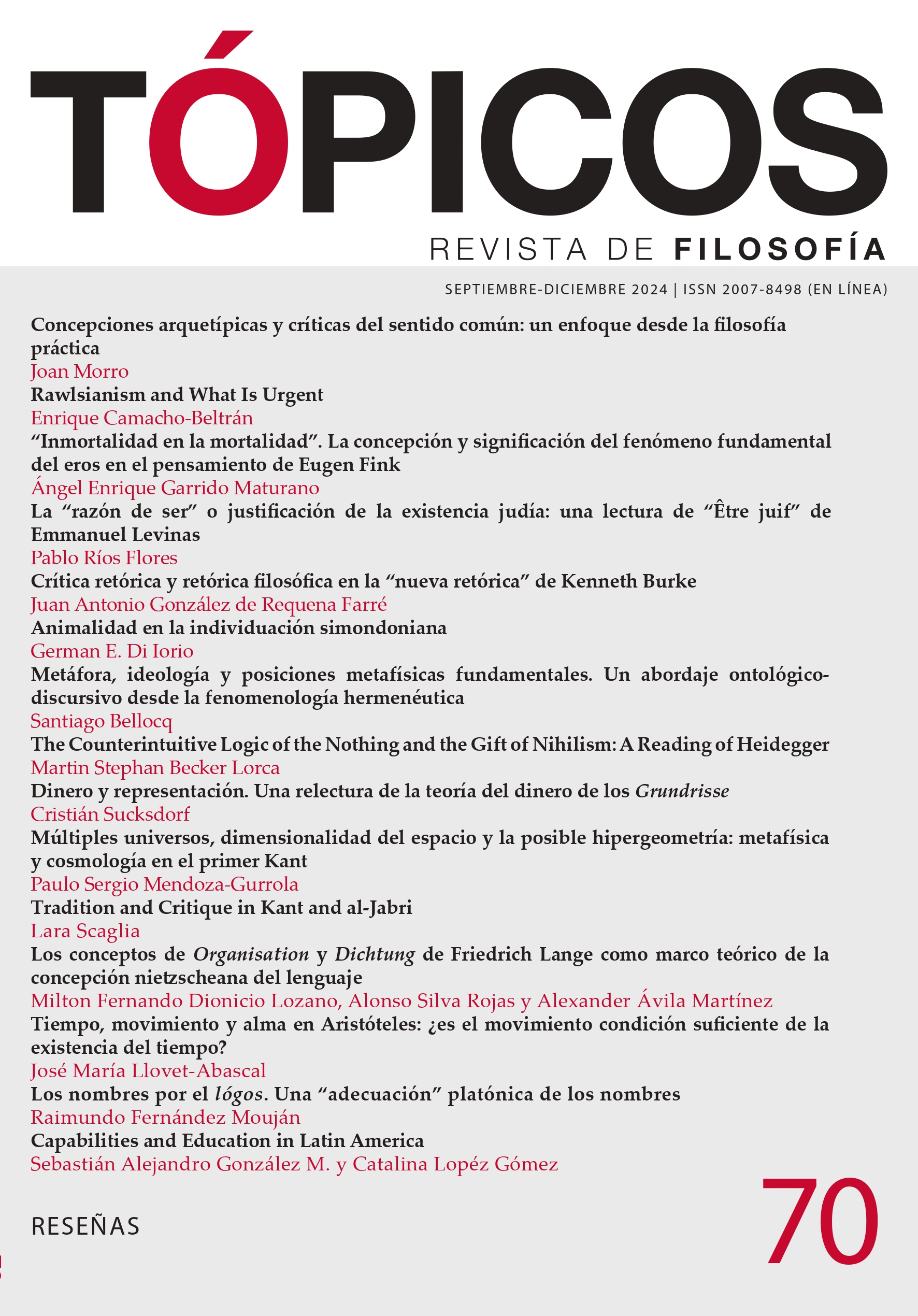Publicado 2024-08-15
Palabras clave
- Rawls,
- razonabilidad,
- concepción política de la justicia,
- aproximaciones en la ética aplicada
Derechos de autor 2024 Tópicos, Revista de Filosofía

Esta obra está bajo una licencia internacional Creative Commons Atribución-NoComercial-SinDerivadas 4.0.
Cómo citar
Resumen
En Justice as Fairness: A Restatement, Rawls afirmó que su concepción de la justicia debería servir de guía para una teoría no ideal de las injusticias del mundo real. No obstante, estableció al mismo tiempo un enigmático límite a su planteamiento, según el cual ni la filosofía política ni la justicia como equidad deben entenderse como enfoques aplicados. Como resultado, no queda claro cómo podría fungir como orientación contra las injusticias del mundo real, ya que presumiblemente se requeriría de conocimientos de ética aplicada. Este artículo se centra en esbozar una posible alternativa ofreciendo una reconstrucción parcialmente exhaustiva de lo razonable como virtud. La esperanza es utilizar la virtud de los ciudadanos razonables para transferir las reflexiones rawlsianas a un tipo especial de controversias de ética aplicada relacionadas con debates públicos urgentes y políticas de resistencia. La idea de esta construcción es permitir que la virtud de lo razonable establezca una norma para la conducta ciudadana.
Referencias
- Anderson, E. (2014, February 11). Social Movements, Experiments in Living, and Moral Progress: Case Studies from Britain’s Abolition of Slavery. The Lindley Lecture at the University of Kansas. URL: http://hdl.handle.net/1808/14787.
- Bureau of International Labor Affairs. (2022, September 28). List of Goods Produced by Child Labor or Forced Labor. URL: https://www.dol.gov/agencies/ilab/reports/child-labor/list-of-goods-print.
- Caney, S. (2012). Just Emissions. Philosophy & Public Affairs, 40(4), 255-300. DOI: https://doi.org/10.1111/papa.12005.
- Clayton, M. & Stevens, D. (2014). When God Commands Disobedience: Political Liberalism and Unreasonable Religions. Res Publica, 20(1), 65-84. DOI: https://doi.org/10.1007/s11158-013-9221-y.
- Cohen, G. A. (2008). Rescuing Justice and Equality. Harvard University Press.
- Dewey, J. & Tufts, J. H. (1981). Ethics. Southern Illinois University Press.
- Friedman, M. (2000). John Rawls and the Political Coercion of Unreasonable People. In V. Davion & C. Wolf (eds.), The Idea of a Political Liberalism: Essays on Rawls. (pp. 16-33). Rowman & Littlefield Publishers.
- Fueller, L. L. (2012). Burdened Societies and Transitional Justice. Ethical Theory and Moral Practice, 15, 369-386. DOI: https://doi.org/10.1007/s10677-011-9300-0.
- Kelly, E. & McPherson, L. (2001). On Tolerating the Unreasonable. Journal of Political Philosophy, 9(1), 38-55. DOI: https://doi.org/10.1111/1467-9760.00117.
- Macedo, S. (1995). Liberal Civic Education and Religious Fundamentalism: The Case of God v. John Rawls? Ethics, 105(3), 468-496. DOI: https://doi.org/10.1086/293723.
- Mandle, J. & Reidy, A. D. (2003). A Companion to Rawls. Wiley-Blackwell.
- Mill, J. S. (2018). The Subjection of Women. Routledge.
- Miller, D. (2011). Taking up the Slack? Responsibility and Justice in Situations of Partial Compliance. In Z. Stemplowska & C. Knight (eds.), Responsibility and Distributive Justice. (pp. 230-245). Oxford University Press.
- Newton, J. (1788). Thoughts upon the African Slave Trade. J. Buckland and J. Johnson.
- Newton, J. (1830). Narrative of Some Remarkable and Interesting Particulars in the Life of the Rev. John Newton. Glasgow.
- Puddifoot, K. (2017). Epistemic Discrimination. In K. Lippert-Rasmussen (ed.), The Routledge Handbook of the Ethics of Discrimination. (pp. 54-67). Routledge.
- Quong, J. (2011). Liberalism without Perfection. Oxford University Press.
- Rawls, J. (1971). A Theory of Justice. Harvard University Press.
- Rawls, J. (1993). Political Liberalism. Columbia University Press.
- Rawls, J. (2001). Justice as Fairness: A Restatement. Harvard University Press.
- Rawls, J. (2002). Law of Peoples. Harvard University Press.
- Rodríguez Zepeda, J. (2006). Un marco Teórico para la Discriminación. CONAPRED.
- Smith, A. (1904). An Inquiry into the Nature and Causes of the Wealth of Nations. Library of Economics and Liberty. URL: http://www.econlib.org/LIBRARY/Smith/smWN.html.
- Stemplowska, Z. (2016). Non‐ideal Theory. In K. Lippert-Rasmussen, K. Brownlee & D. Coady (eds.), A Companion to Applied Philosophy. (pp. 284-296). Wiley.
- Tarrow, S. (2008). Charles Tilly and the Practice of Contentious Politics. Social Movement Studies, 7(3), 225-246. DOI: https://doi.org/10.1080/14742830802485601.
- Vaca, M. (2022). ¿Qué nos dice la teoria ideal sobre la discriminación? In E. Camacho-Beltrán and Luis Muñoz Oliveira (eds.), Trato de sombras: estudios sobre discriminación incorrecta. (pp. 123-154). UNAM-Centro de Investigaciones sobre América Latina y el Caribe.
- Valentini, L. (2012). Ideal vs. Non‐ideal Theory: A Conceptual Map. Philosophy Compass, 7(9), 654-664. DOI: https://doi.org/10.1111/j.1747-9991.2012.00500.x.
- Wall, S. (2013). Perfectionist Justice and Rawlsian Legitimacy. In J. Mandle & A. D. Reidy, A Companion to Rawls. (pp. 413-429). Wiley-Blackwell.
- Walzer, M. (1993) Spheres of Justice: A Defense of Pluralism and Equality. Basic Books.
- Wenar, L. (1995). Political Liberalism: An Internal Critique. Ethics, 1(106), 32-62. DOI: https://doi.org/10.1086/293777.
- Ypi, L. (2012). Global Justice and Avant-garde Political Agency. Oxford University Press.





